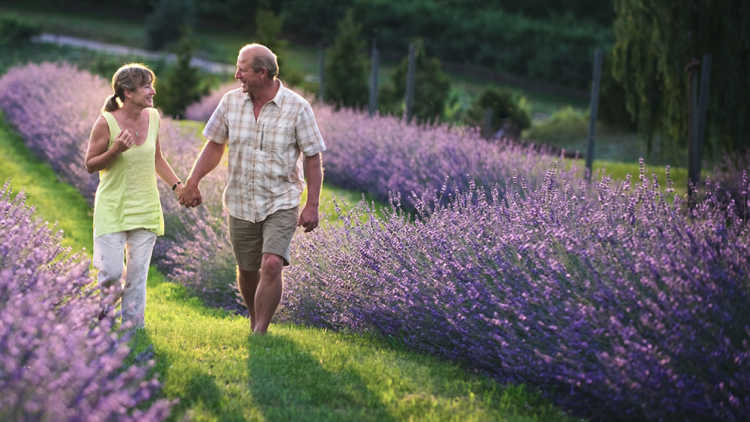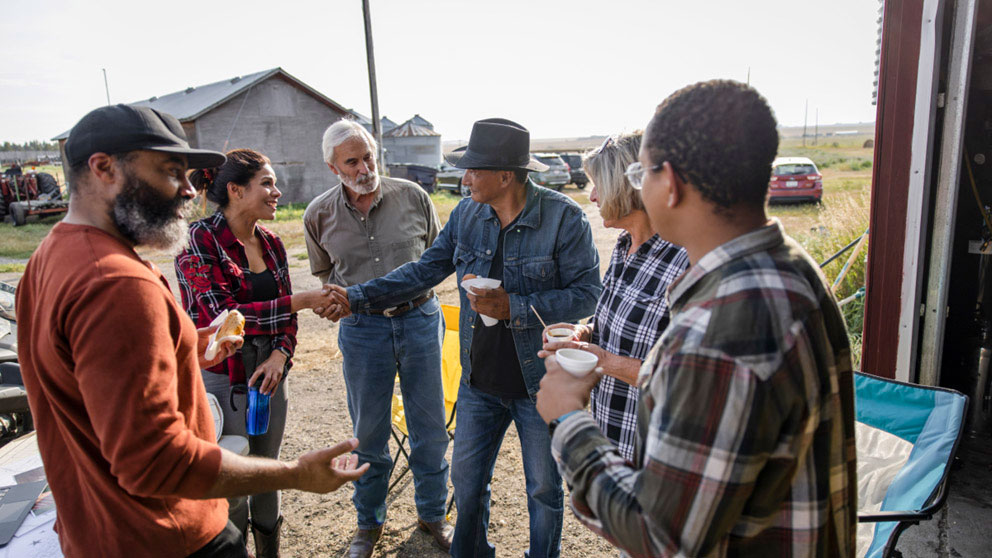Kelowna grower shifts strategy with grace

Over the past 20 years, Andrea McFadden has morphed her business strategy multiple times to make farming on eight acres in Kelowna viable. Currently, the self-professed plant lover grows 60 lavender varieties, over 120 damask roses and nearly a dozen different herbs for three uses – the culinary market, for seed, or to be distilled on-farm, with the essential oil and hydrosol* sold as is or used in farm-made products.
Through all the ups and downs, Andrea remains excited about what comes next at Okanagan Lavender and Herb Farm and is eager to share the lessons she’s learned over the years.
Practice resilience
My grandfather founded a successful nursery in the region in 1908. My dad was fascinated by growing grapes and he and my brother produced the first family wine in 1989, the beginnings of Quails’ Gate Winery, which my other brother now heads. I decided to pursue farming after my kids were born, leaving teaching.
I replaced the aging, declining orchard with grapevines. Just as the grapes were really producing, a killer frost wiped out everything, except some lavender I’d planted as an experiment. I’m always experimenting, fascinated by plants respected historically for traditional benefits, like lavender as an anti-inflammatory. I thought, “Perhaps I’ve got something here,” and planted more.
Creativity and a positive attitude toward change is important
I also love learning and creating. This helped shape our products.
I’ve always believed change is good. You harvest a bounty of a certain plant one year, but not enough the following year to create a certain product. That’s part of farming. I’m able to see different perspectives and opportunity. People would be scared to hear all the ideas in my head. The flip side is keeping focus, really considering, ‘Is this idea good for the business?’
I also love learning and creating. This helped shape our products. At first, I sold soaps and sachets at the local farmers markets and in my tiny on-farm shop. But when customers responded positively, I took a calculated risk, borrowing for the farm for the first time to expand the store, add a better distilling area, a commercial kitchen and offices in a new on-farm, 2,000-square-foot structure.
Trends matter
Talking with family and seeing wine industry tasting bars, I embraced experiential tourism. Visitors were encouraged to walk in the fields, learning about the plants and how we craft what we make. We hosted seasonal events, starting with a stroll through rows of plants that we lit up at night, followed by an indoor sensory experience. Guests sampled food, drinks and products made from what they’d just seen. They could create a personalized beauty or body care product at our aromatherapy bar.
International validation helps too
We’ve changed our labelling a couple times to reflect the nature of our products more clearly; however, placing third with one of our face care products in the North American Clean Beauty Awards in 2017 was big. There were entries from Australia, Europe, the U.S. and Canada. It confirmed the business was on the right track and that there was an ever-growing number of people seeking trusted, more transparently created beauty products.
Even when change isn’t yours to choose, there can be positives
More recently, increasing incidents of forest fire smoke in the area deterred farm visitors. Some neighbours actively discouraged customers’ parking for events. Then the pandemic meant no guests. I poured my heart and soul into the experiential business, but survival depended on change. We accelerated our five-year business plan, moving very quickly to shift into e-commerce and learning how to operate an online store and wholesale.
It wasn’t easy but it’s been good, especially with an ever-tightening on-farm labour market. Online shopping has taken off and so has the amount of online beauty information and influencers. We’ve also gained access to customers world-wide and currently ship across Canada.
Use data to drive decisions
This year, our 100 per cent damask rose hydrosol skin toner took second in the Clean Beauty Awards. While the Clean Beauty Awards provided validation, it’s also important to draw on data. The information we learn from Google searches and online reviews helps inform our business decisions. Some of our historic best sellers tanked online, like lavender salt scrub, I think because experiencing how it makes your hands feel doesn’t work online.
We’ve also ditched some labour-intensive items. Items for the culinary sector are now sold as flavouring for others’ products like ice cream and cider. This stream comes largely through networking over the years – so important.
Advice I wish I had earlier
Spend time mapping the topography and soil structure, really understand it and what it can sustain. Some things done here were smart but so many more could have been smarter, like planting trees in the best spots to mitigate wind damage, particularly with more weather extremes and our diverse soil types.
Right now, I’m very interested in leaving parts of the farm to go back to nature to improve biodiversity. For years, I’ve belonged to the Canadian Association of Family Enterprises. When you’re a third-generation grower like me, there’s also an emotional connection to the land. Caring for it in the long-term is always factored into my business strategy.
*Hydrosol has similar qualities as pure oil but is water-based, much less concentrated and safer to apply on skin.
From an AgriSuccess article by Myrna Stark Leader.

How do you deal with change and the process of implementing new practices on the farm?
